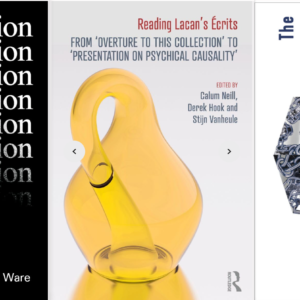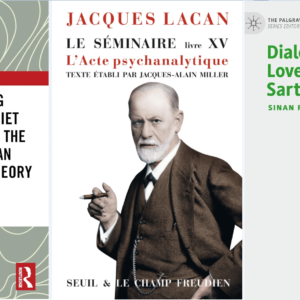News – September 2014
The London-based Centre for Freudian Analysis and Research (CFAR) has for many years been running a public lecture programme introducing psychoanalysis through Lacan’s work. Last month it published a selection of these talks on some of the fundamental concepts of psychoanalysis. Introductory Lectures on Lacan, edited by Astrid Gessert, is available from Karnac Books with free international shipping. The Centre also produces a regular print journal, with many papers from previous editions available online for free on the journal’s site here.
A great interview with veteran Lacanian psychoanalyst Moustapha Safouan made the rounds on social media last month. Safouan, now 93, was one of Lacan’s early students, having met him first in 1949, and being present from the very start of Lacan’s Seminar teaching in 1951 when it took place at Lacan’s home in front of a small band of adherents. The sprawling interview offers some fascinating insights into Lacan’s work as analyst – he analysed Safouan himself – and the political upheavals that underwent the faction Lacan led, both up to and since Lacan’s death. Of particular interest is a story Safouan tells of when Lacan was confronted with armed robbers:
They wanted money, and Lacan gave them money. Then the man with the pistol stood guard over us while the other went and searched the whole apartment. He came back and said he couldn’t find anything – not even a cheque. And Lacan said to them “Do you think I swim in gold?” It was an interpretation, and it was not bad. Anyway, when we were alone with the man with the gun he said “What do you want. My life? I’m sixty years old. If it’s my life you want then take it.” He wasn’t joking – if the man wanted his life then he could take it. You shouldn’t interpret this as the sign of a man who was tired of living, or had run out of energy, like you could say of Trotsky at the end of his life. He was a man who had always been decided from the very beginning of his life to live with, as you say in French, ‘le tombeau ouvert’ – with the coffin open. Life was not everything. He said to the thief “You know that when I make a lot of money I give some to left organisations but not like this”. Once they left, the first thing he said before calling the police was “These young people are so stupid”. As if this stupidity was the only thing that bothered him.”
If you’re looking for more work by Safouan, Richard G. Klein has posted Safouan’s The Unconscious and its Scribe, his book on rhetoric, on his excellent site here.
Radio Lacan has more recordings of Lacan’s Seminar up on the site, offering a rare chance to hear his presentation style in the live transmission of his teaching. Amongst them is the opening lessons of Seminar XX, ‘Encore’; Seminar XXI, ‘One thought that it was a mistaken moon on the wings of love’; and his intervention at the VII Congress of the Freudian School in Rome in 1974, ‘The Third’. The recordings are sometimes patchy and of poor quality but the project of making them available on the web is something Lacanian scholars will surely be indebted for.
Amongst other new publications last month was Lacan and Religion by assistant Professor of Religion at Shimer College, Chicago, Arun Dunlop. With the question of Lacan’s faith (or lack of it) being still very much at issue – see below – and Lacan’s work containing many appeals to religious iconography as a tool for theoretical innovation (the three registers suggesting the Trinity; or the Borromean knot deriving from the Celtic cross, for instance), this is an especially timely book.
As part of the promotion for his new book, What About Me?, Belgian Lacanian analyst and scholar Paul Verhaeghe followed up his appearance at the Freud Museum in London last month with this article in The Guardian protesting the impact of neo-liberal market society on the modern subject. Worth a read as an introduction to his more recent thinking, as developed in the book.
Although first published in the US in July, Jonathan Redmond’s Ordinary Psychosis and the Body is well worth mentioning too for those not yet familiar with it. Like Verhaeghe and Dunlop’s works, Redmond’s covers a topic which is the subject of much debate in the Lacanian world, even if the recognition of ‘ordinary’ (or ‘white’) psychosis has been around for more than a hundred years. By way of introduction to the book, a paper by Redmond on the same theme is available on the for free on the American National Institute for Health’s site here.
Translator of the Écrits Bruce Fink last month released the third in his series of Inspector Canal detective novels. As the character’s anagrammatic name suggests, they are based (loosely) on the figure of Jacques Lacan. A Purloined Love is available here, as are the first and second in the series.
The Psychoanalysis in Our Time research circle announced a call for papers last month for its upcoming conference taking place in Tallinn, Estonia, in March 2015. The second such event, following sessions in Copenhagen and Sauðárkrókur, Iceland, in July, will explore the topic ‘Psychoanalysis and Science’. More details and how to submit papers can be found here; keep an eye on the group’s site at http://psychoanalysisinourtime.wordpress.com for further announcements.
Lacanian Compass’s annual Clinical Study Days event was announced in September, due to take place in Miami Beach, Florida, in January next year. ‘Encounters with the Real’ will feature prominent Lacanian speakers from the World Association of Psychoanalysis, including Vicente Palomera and Pierre Gilles Gueguen. Registration is available on the site here.
The New York-based Lacanian association Apres-Coup is hosting a seminar on Wednesday 8th October entitled ‘Introducing Lacan: On the Three Registers’, looking at how Lacan develops his view of how reality is constituted into the Real, Imaginary and Symbolic. The event is free and open to all.
In France, Institut de l’Enfant together with Université Populaire Jacques Lacan have organised a study day on ‘Interpreting the Child’. Scheduled for Saturday 21st March 2015 in Paris there is now a call for papers (5,000 characters max) to be submitted by 15th December. A site has already been created with more information: http://jie2015.wordpress.com/.
Florencia F.C. Shanahan of the Irish Circle of the Lacanian Orientation has written a brief report on Eric Laurent’s talk in Dublin last month on the occasion of the publication of a translation of his new book, Lost in Cognition. You can read the report here.
Lastly, some news from France. In November 2011 Judith Miller, Lacan’s daughter, took legal action against historian of psychoanalysis Elisabeth Roudinesco about claims made in her book – recently translated into English – Lacan: In Spite of Everything. Roudinesco had suggested that Lacan wished for a Catholic funeral in Rome or Venice, despite his atheist convictions; as it happened, Lacan was buried in the cemetery at Guitrancourt, France, where he had a country home. In the ensuing defamation trial, the French tribunal in the case gave its initial verdict in favour of Judith Miller, but did not recall the book to amend the claim. There then followed an appeal by Roudinesco and her publishers at Seuil (Lacan’s own former publishers), and last month the court reversed the decision of the previous judgement, deeming that the passage in question is not defamatory. The verdict noted that the report of his wishes for burial were not a contention between Roudinesco and Lacan’s family – the claim that the latter did not respect Lacan’s wishes – but “between Lacan and Lacan himself”. A summary of the judge’s verdict – which involves a deep analysis of the two passages in contention in the book – can be found in a report from the French news outlet Mediapart here.
Got news? Get in touch.




Leave a Reply